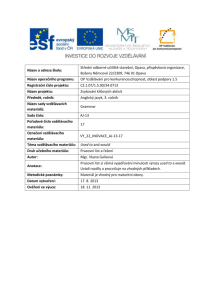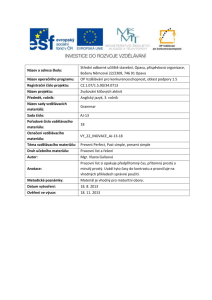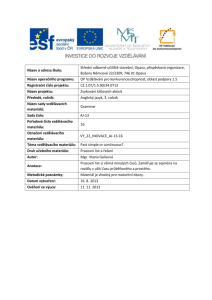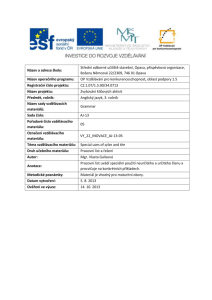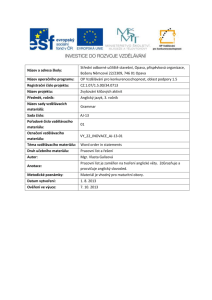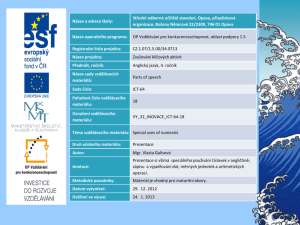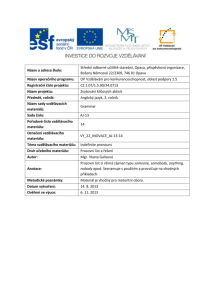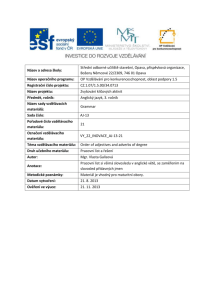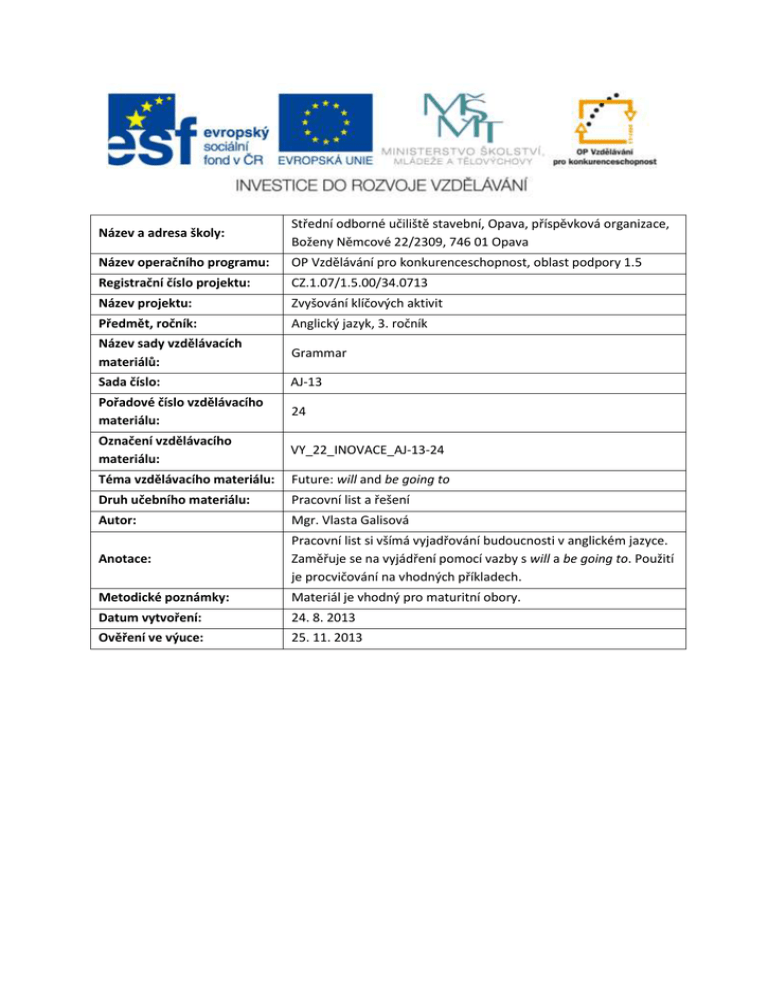
Název a adresa školy:
Střední odborné učiliště stavební, Opava, příspěvková organizace,
Boženy Němcové 22/2309, 746 01 Opava
Název operačního programu:
OP Vzdělávání pro konkurenceschopnost, oblast podpory 1.5
Registrační číslo projektu:
CZ.1.07/1.5.00/34.0713
Název projektu:
Zvyšování klíčových aktivit
Předmět, ročník:
Anglický jazyk, 3. ročník
Název sady vzdělávacích
materiálů:
Grammar
Sada číslo:
AJ-13
Pořadové číslo vzdělávacího
materiálu:
24
Označení vzdělávacího
materiálu:
VY_22_INOVACE_AJ-13-24
Téma vzdělávacího materiálu:
Future: will and be going to
Druh učebního materiálu:
Pracovní list a řešení
Autor:
Mgr. Vlasta Galisová
Anotace:
Pracovní list si všímá vyjadřování budoucnosti v anglickém jazyce.
Zaměřuje se na vyjádření pomocí vazby s will a be going to. Použití
je procvičování na vhodných příkladech.
Metodické poznámky:
Materiál je vhodný pro maturitní obory.
Datum vytvoření:
24. 8. 2013
Ověření ve výuce:
25. 11. 2013
Review:
Will
We use it to give information about future. We don´t use will to talk about
plans, arrangements or schedules.
The holidays will start soon.
We use it for instant decisions made at the time of speaking.
I haven´t done the washing-up. Don´t worry! I´ll do it for you.
We use it for prediction based on your opinion. Typical words are think,
hope, be sure.
I hope, she will arrive soon.
We often use will with the adverbs certainly, definitely, probably,
possibly, after will but before won´t.
I´ll definitely go to the party.
Sam probably won´t go.
Be careful! After when, as soon as, until, after, before, if, unless, we often use
the present simple the express to future, not will.
When you don´t have any food, Peter will buy it.
Be going to
We use it for plans and intentions.
She is going to be a doctor.
We use it for predictions based on present evidence.
Look on the sky, heavy clouds. It is going to rain.
We use it for near future or for something which has already started to
happen.
I´m going to be sick.
Be careful! When we are speaking, we often pronounce going to as gonna. It is
sometimes also in informal writing, especially in American English.
Practice:
1. Underline the correct option. Sometimes both are possible.
1 Your plan won´t/is not going to work.
2 Those cakes look lovely. I´ll/´m going to take two.
3 The actor, Tom Dickins, has been found guilty of stealing and will/is
going to spend one year in prison.
4 She will/is going to have a baby next month.
5 They will/are going to get married on Saturday.
6 I hope I´ll/´m going to see you later.
7 The sky is very dark. It´ll/´s going to rain.
8 Who will/is going to be there tonight?
2. Complete the predictions using the verbs in brackets and either will
certainly, will probably, will possibly, probably won´t or definitely won´t.
50 years from now…
1 There will possibly be a city on Mars. (be)
2 People …………………………………through the air and not on roads.
(travel)
3 There …………………………a vaccine for AIDS. (be)
4 We ……………………………..all our classes at home. (have
5 Robots …………………………….think like human. (be able to)
6 There …………………………… a lot of oil in the world. (be)
7 We …………….. coins any more. (have)
8 We ………………………….live forever. (be able to)
3. Write about your plans for the future and what do you think will
happen next year.
……………………………………………………………………………………
……………………………………………………………………………………
……………………………………………………………………………………
……………………………………………………………………………………
……………………………………………………………………………………
……………………………………………………………………………………
……………………………………………………………………………………
……………………………………………………………………………………
…………………………………………………………………………………...
Key:
Ex. 1
2 ´ll 3 will/is going to 4 ´s going to 5 are going to 6 ´ll 7 ´s going to 8
will/is going to
Ex. 2
2 will probably travel
3 will certainly be
4 will possibly have
5 will possibly be able to
6 probably won´t be
7 definitely won´t have
8 definitely won´t be able to
Ex. 3
Student´s own answers.
Literatura:
SWAN, M. Oxford English Grammar course intermediate. Oxford: OUP, 2011.
ISBN 978-0-19-442082-2.
DAVIS, F.; RIMMER, W. Active Grammar with answers Level 2. Cambridge:
CUP, 2011. ISBN 978-0-521-17599-9.
FOLEY, Diane Hall and Mark. My grammar lab. 1. publ. Harlow: Pearson
Longman. ISBN 978-140-8299-159.

